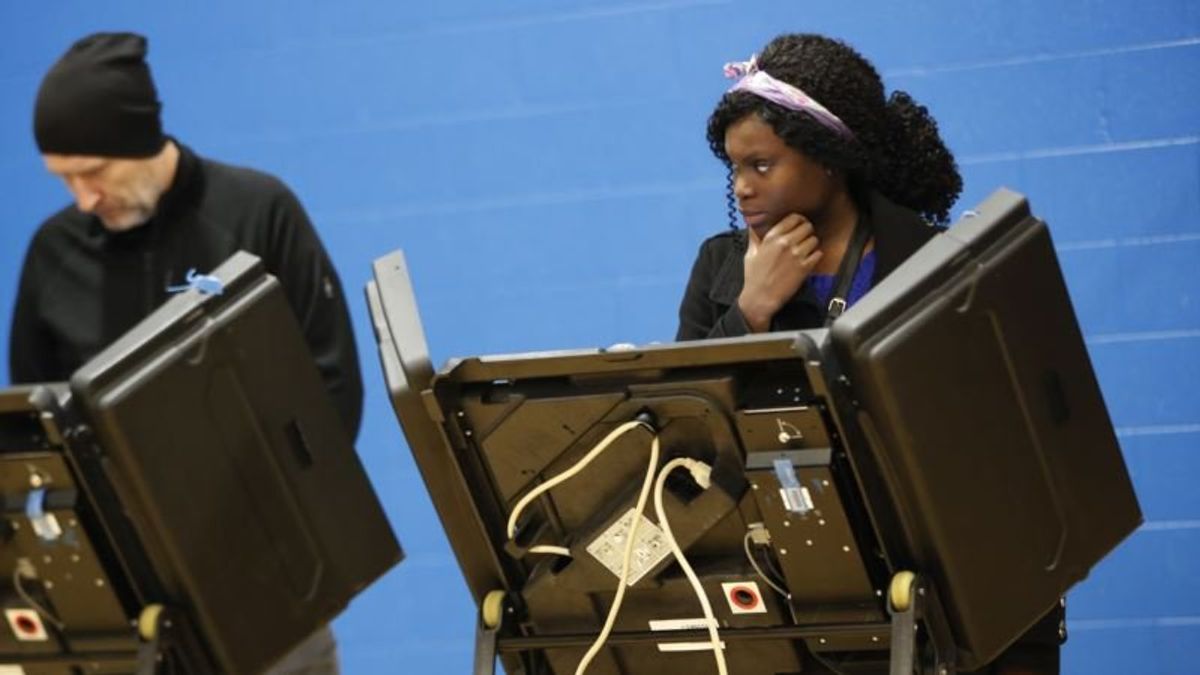
Officials: No ‘Coordinated Campaign’ to Disrupt US Vote
Officials: No 'Coordinated Campaign' to Disrupt US Vote

Despite concerns about foreign interference, voting in the 2018 U.S. midterm elections got off to a relatively uneventful start on Tuesday with officials reporting no attempted disruptions of the vote.
While it's still early on a pivotal voting day that will shape the direction of the country for the next two years, absent are reports of a much-feared cyber assault on U.S. election systems by Russia or other foreign hostile actors. By all accounts, ballot casting in the country's 170,000 voting centers has been thus far free from any major hiccups or foreign interference.
"We continue to monitor…[but have] nothing significant to report at this point," a Homeland Security Department official said during a call with reporters early Tuesday. "We have not seen to date any sort of coordinated campaign, but we are preparing as though there will be."

In the lead-up to election day, there were persistent worries that Moscow or other U.S. adversaries might attempt to disrupt the election in a reprise of Russian meddling in the 2016 U.S. presidential vote. As early as August, U.S. Director of National Intelligence Dan Coats warned that the threat of Russian interference was "real" and "continuing."
But fear of large-scale meddling has not been borne out. While U.S. agencies have reportedly logged as many as 160 reports of suspected foreign interference in the elections since Coats' August warning and social media networks have taken down hundreds of suspicious accounts, the number of attempts have not risen to the level of 2016, when Kremlin-linked cyber actors targeted the election systems of at least 21 U.S. states and orchestrated one of the largest influence operations in history to sway the outcome of the vote.
"We haven't seen anything that is alarming," said John Gilligan, executive chairman of the Center for Internet Security, which has deployed intrusion detection sensors into the election systems of 43 states, said last week.
Decentralized voting leaves security to local officials
The United States has a highly decentralized election system, with virtually all elections administered by state and local governments. However, in the two years since the Russian attack, U.S. states have worked closely with a host of federal agencies such as the Department of Homeland Security, the FBI, and the Directorate of National Intelligence to boost their cyber defenses and the integrity of their election systems.The DHS has conducted on-site threat assessments in 21 states while network intrusion detection sensors have been deployed.
"We realize this is a complicated issue, with high interest from malicious actors, but together we have collaborated with IT professionals, the private sector, the federal government and others to do everything in our power to safeguard election infrastructure and restore voter confidence," Jim Condos, Vermont Secretary of State and president of the National Association of Secretaries of State, said in a statement on Friday.
Top U.S. security officials have offered similar assurances in the run-up to Tuesday's vote.
"At this time we have no indication of compromise of our nation's election infrastructure that would prevent voting, change vote counts, or disrupt the ability to tally votes," said the DNI's Coats, FBI Director Christopher Wray, Attorney General Jeff Sessions and Homeland Security Secretary Kirstjen Nielsen in a joint statement released late Monday.
The officials, however, warned that "Americans should be aware that foreign actors and Russia in particular continue to influence public sentiment and voter perceptions."

Voter suppression concerns
While concern about foreign interference has drawn the most attention in recent months, voter suppression, a recurring but controversial theme of U.S. elections, has emerged as a source of concern for voting rights advocates.
A recent report by the Brennan Center for Justice at New York University estimated that in the last two years, at least eight states have adopted "more stringent voting laws" while in the last eight years, 23 states have tightened voting rules such as instituting stricter ID requirements.
Concerned that these laws disenfranchise voters, the Brennan Center, the ACLU, the National Lawyers' Committee for Civil Rights, and other civil rights organizations have taken the states to court.
“This has been a year [in] which we have been fighting an aggressive and relentless campaign of voter suppression across the country,” said Kristen Clarke, president and executive director of the National Lawyers’ Committee for Civil Rights.
Conservative critics and President Donald Trump say the focus on voter suppression is a distraction from what they see as a greater concern: voter fraud.
Earlier this year, Trump disbanded his voter fraud commission that was created to study alleged election fraud in the 2016 vote. The commission had no success validating the president's claims that millions of fraudulent ballots were cast in the 2016 election.
Aging voting systems
Aging voting machines and election systems that produce no paper trail have been another source of concern during the current elections and cause of voting irregularities reported during early voting in several states.

Forty-three states use voting machines that are no longer made, according to the Brennan Center. Five states – Delaware, Georgia, Louisiana, New Jersey, and South Carolina rely exclusively on touchscreen systems that produce no paper trail while eight others use them in some of their jurisdictions.
Nine states with toss-up or competitive House, Senate or gubernatorial races still use paperless voting machines, according to the Brennan Center. Those states include Georgia, where Democrat Stacey Abrams is running against Republican Brian Kemp, and Texas where Democratic Representative Beto O'Rourke is challenging Republican Senator Ted Cruz.







